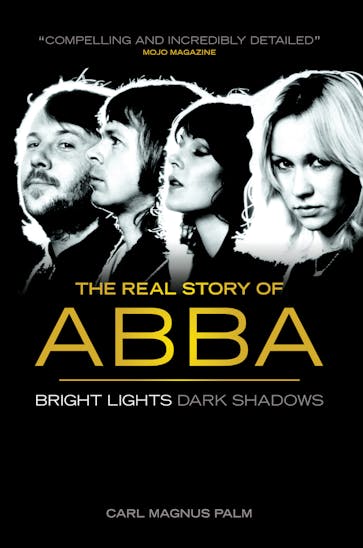Books about ABBA and related subjects
ABBA biographies, musical examinations and pictorial surveys
Rolling Stone interview
published April 01, 2010
Rolling Stone (Australia), December 2001
Abba: Damaged In Translation
The strange, sordid career of the Swedish fab four, now in hardcover.
The truth about Abba hurts. For all the gay spandex, toothy grins, indelible melody and phenomenal success of the group's pop-tastic reign, the real story is one sad tale.
'It is, it is," muses Carl Magnus Palm, author of the doorstop-sized new bio, Bright Lights Dark Shadows - The Real Story of Abba. "We're a melancholy bunch up there. I mean, let's not exaggerate but... we're not prone to happiness, somehow."
Abba's story could only be told by a Swede. Not just because a socio-cultural perspective is essential, but because so much overlooked detail resides in Swedish-language accounts. Local clippings, archives and first-hand witnesses were at Palms' fingertips over nearly 10 years of research. He even worked with Bjorn Ulvaeus and Benny Andersson on his first Abba book of 1992, The Complete Recording Sessions.
"The main surprise for me was to find out that the tensions within the two couples had (existed) all the way through the whole thing," Palm says. "They both came together in 1969 and I was intrigued to find that the tensions began straight away, not just the year before their divorces (Ulvaeus from Agnetha Faltskog in 1979; Andersson from Anni-Frid Lyngstad in 1981).
"They were actually quite open about all this in their Swedish interviews back then, but that honesty never really crossed over to Australia or the UK or Germany, where they always came across as smiley happy showbiz couples."
And, in a delightfully subliminal way, as archetypal Scandinavian sex machines - an aspect of Abba's export appeal politely ignored at home, Palm says.
"I guess it wasn't really PC in the '70s to write 'these ladies are gorgeous and I'd like to give them one', as they wrote in the Australian papers. We might mention they're pretty in a polite way, but..." But not "Wow, look at that arse"?
"Exactly, no. Definitely not."
Palm's story is rich in background, probing the social history of Sweden and also Norway, where Lyngstad was born to a doomed teenage mother and an occupying German soldier in 1945 - an extraordinary tale in itself. The first 10 chapters also analyse the pre-Abba careers of the four members and their overreaching manager, Stig Anderson, all of whom had substantial musical experience in the '60s.
But it's Faltskog who emerges as the group's most intriguing player. Palm describes a bright-eyed and gifted teenager whose very joie de vivre is annihilated by the hit factory philosophy and all-consuming demands of Abba's popularity. A bizarre coda to her story involves an ill-advised relationship with a stalker who had nurtured his obsession from the age of eight.
"I think that's terribly tragic," Palm says. "She had a joy in music and a unique talent for melody that could have been developed. That one album where she wrote her own songs (self titled, 1968), that was a really great album and it showed a lot of promise."
Abba's pivotal Australian tour of 1977 occupies three chapters in Palm's book: an escalating trauma involving a tour, a movie and an album they were virtually forced to make. And all set against the personal dramas of Faltskog's second pregnancy and Lyngstad's first meeting with her German father, previously presumed dead.
Perhaps the ugliest twist to this prefab pop saga is Sweden's own response to it. While Abba has always tolerated a daggy reputation around the world, Palm describes a local reaction nothing short of vilification.
"The '70s was a very strange time in Sweden," he says. "It was this left-wing cultural climate which coloured everything and it came with a sort of judgmental mentality as well. Everything had to have a political message. Music that was just entertaining pop was bad. I think it did make them just slightly bitter."
Bitter or immortal. Nearly 20 years after their last album, Abba's legacy echoes through the current pop charts. Reclusive Swedish songwriter Max Martin (Britney Spears, Backstreet Boys, 'NSync) is just one direct heir to the fine art of making fluff stick.
"Bjorn and Benny were the hit factory, Frida and Agnetha were the performers," Palm says. "Bjorn and Benny could just as well have not been in the group, if you think about it. No one really cared for them visually. Maybe their legacy might be that it's actually possible to do very accessible pop music and yet earn some kind of respect. The respect may be grudging, but it's still there."
MICHAEL DWYER
Bright Lights Dark Shadows - The Real Story of Abba is now available through Omnibus Press.

Bright Lights Dark Shadows - The Real Story Of ABBA. Revised and updated edition published by Omnibus Press, January 30, 2014. English language. 600 pp. Paperback. ISBN: 1783053593.
Order from
- Amazon.com (US)
- Amazon.com (Kindle edition, US)
- Amazon.co.uk (UK)
- Amazon.co.uk (Kindle edition, UK)
- Amazon.de (Germany)
- Amazon.fr (France)
- Adlibris (Sweden)
More info
- Back and front of cover
- Facebook page for the book
- Reader reviews (2014 edition)
- The Birth of Frida (excerpt from 2014 edition)
- Editor Chris Charlesworth blogs about the book
- icethesite story about the 2014 edition
- Original 2001 edition of the book
- Journalist Richard Williams blogs about the book
- TV interview about the book
- The Guardian's Valentine's Day reading Top Ten
- Long-time fan Ian Cole on the book
- Review extracts (print media and radio)
- Reviews and interviews in full (print media and radio)
- German version of the book
- Russian version of the book
- Audio book version
ABBA
BooksStudio albumsCompilations and box setsDVDsSolo projectsGuided tour of ABBA's StockholmABBA lectureMore ABBA© 2003–2025 Carl Magnus Palm. All rights reserved. Produced by Disco Works